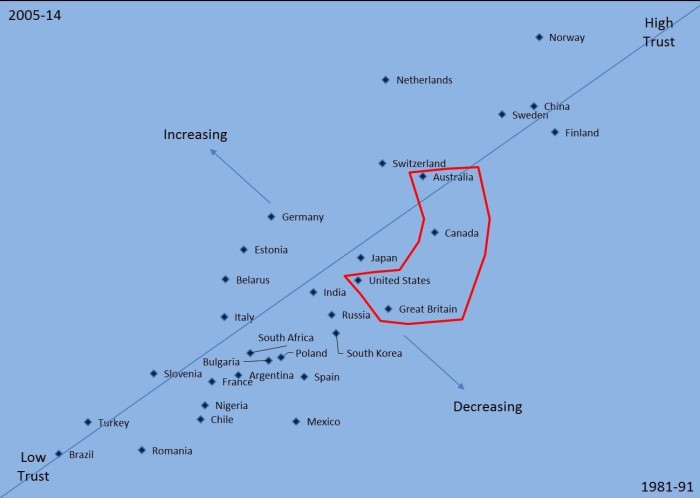Do you think most people can be trusted? This is a question first asked in the 1950s, and from the early 1980s incorporated into the World Values Surveys. It has since proven to be one of the most interesting and important indicators of the strength and quality of societies and communities across the world.
Levels of social trust, averaged across a country, predict national economic growth as powerfully as financial and physical capital, and more powerfully than skill levels – over which every government in the world worries about incessantly. It is also associated with many other non-economic outcomes, such as life satisfaction (positively) and suicide (negatively). In short, it’s not much fun living in a place where you don’t think most other people can be trusted. Low trust implies a society where you have to keep an eye over your shoulder; where deals need lawyers instead of hand-shakes; where you don’t see the point of paying your tax or recycling your rubbish (since you doubt your neighbour will do so); and where you employ your cousin or your brother-in-law to work for you rather than a stranger who would probably be much better at the job.
Attending the Global Community Forum in South Korea this week, it seemed a good time to have a look at how different countries are faring (with particular thanks to Ewen McKinnon in the UK Cabinet Office). I first had a go at plotting out national differences and trends in social trust more than a decade ago. This confirmed the decline in ‘social capital’ as documented by Bob Putnam in the USA, but showed it was happening in all the Anglo-Saxon countries, which formed a tight cluster sliding from the 40s to the 30s as a percent of the public who thought others could be trusted. But the plot showed that this was not a universal trend. The Nordic nations, for example, formed a very different cluster: highly trusting and getting more so, with typically 60 percent or more saying others can be trusted. At the other end of the scale, some low trust nations were moving up the trust rankings (such as Mexico), while others (such as Argentina) were sliding even further down towards the 10 percent level.
So how are we doing today? Well, it’s a mixed picture, and one that policymakers should take pretty seriously. The Nordic nations are still top of the social trust league tables. Today, the Norwegians have risen to the point that three-quarters now say most others can be trusted, though the Finns have slipped back slightly to a more modest 60 percent. The tight Anglo-Saxon cluster of a decade ago has started to spread out: the Australians, for example, have moved up past 50 percent saying most others can be trusted – not far behind Nordics – but the Americans and Brits have slipped backwards, to around 35 and 30 percent respectively. For Great Britain, the main fall occurred in the 1990s and we’ve broadly flat-lined since, the last World Values Surveys data point frustratingly being 2007.
Other countries that have moved up the social trust rankings include the Netherlands (now at a Nordic-level near 70 percent); Switzerland; Germany (now on 45 percent); and Estonia. All these nations can expect a corresponding boost to their growth and wellbeing. But others have slid down, such as: Romania; Chile; Mexico; Spain; Russia; and our hosts at the Global Summit, South Korea.
The Koreans are an impressive and industrious people, who are famous across the world for their outstanding educational performance. They are right to be thinking about what they can do to boost falling social trust and the strength of their communities. And so should we. When was the last front-page article in the FT, NYTimes or Economist on social trust – and why not? Social trust is a deep-seated indicator of the health of societies and our economies. It merits much more attention than it gets.

